Managing chronic conditions like diabetes, heart disease, or COPD can be overwhelming, but it doesn’t have to be. With Chronic Care Management (CCM), you can take control of your health with personalized support tailored to your specific needs. Imagine having a dedicated healthcare team consistently supporting you, guiding your care journey with precision and ensuring you receive the attention and personalized care needed—minimizing the concern of frequent hospital readmissions.
CCM offers more than just basic care. It provides ongoing, coordinated support designed to help you manage your condition, improve your quality of life, and give you peace of mind. In this article, we’ll dive into the benefits of CCM and how it helps you stay on top of your health.
What is Chronic Care Management?
Chronic Care Management is a structured approach to healthcare for individuals with two or more chronic conditions expected to last at least 12 months or until the end of the patient’s life. These conditions, which can include heart disease, asthma, arthritis, and more, often require regular monitoring and frequent communication with healthcare providers.
The core of CCM is the development of a personalized care plan that includes your treatment goals, necessary medications, and strategies to manage your condition. Healthcare professionals—such as doctors, nurses, and specialists—work together to ensure that your care is consistent and well-coordinated. This helps you manage your condition effectively, avoid unnecessary hospitalizations, and stay on track with your treatment plan.
A major component of CCM is the regular monitoring of your health through check-ins, follow-up appointments, and sometimes Remote Patient Monitoring (RPM). This proactive approach helps healthcare providers detect early signs of health issues and intervene before complications arise.
The Benefits of Chronic Care Management
Proactive Care Coordination
With CCM, all members of your healthcare team, from doctors to specialists, stay in constant communication. This proactive coordination helps ensure that you receive seamless care, reducing the risk of treatment delays, missed medications, or conflicting advice from different providers.
Personalized Care Plans
A key feature of CCM is the individualized care plan tailored to your specific health needs. This plan outlines the steps you need to take to manage your condition, from medications and therapy to lifestyle changes. Having a structured, personalized approach reduces the risk of complications and improves overall health outcomes.
Continuous Monitoring with RPM
Many patients enrolled in CCM also benefit from RPM. RPM allows your healthcare team to monitor your health in real time using devices that monitor vital signs like blood pressure, glucose levels, and heart rate. This data is automatically sent to your healthcare provider, allowing them to respond quickly to any concerning changes in your condition.
For instance, if you have high blood pressure, RPM can help your doctor monitor your levels from home and make adjustments to your treatment as needed, preventing a potential hospital visit. If you are managing multiple chronic conditions, ask your healthcare provider about incorporating RPM into your CCM plan for additional support and oversight.
Reduced Hospital Readmissions
A significant goal of CCM is to prevent unnecessary hospital readmissions. After you leave the hospital, your care team continues to monitor your progress, ensuring that you follow your treatment plan and make a smooth recovery. This type of ongoing support helps to avoid complications that might otherwise lead to a return to the hospital.
Cost Coverage and Medicare Benefits
For many patients, concerns about cost may arise when considering long-term care services. The good news is that Chronic Care Management services are typically covered under Medicare Part B. This coverage ensures that the non-face-to-face services provided under CCM, such as care coordination, check-ins, and health monitoring, are covered by Medicare. Medicare uses CPT codes to reimburse healthcare providers for CCM services. These codes include:
- CPT 99490, which covers at least 20 minutes of clinical staff time coordinating care for patients with two or more chronic conditions.
- CPT 99491, which covers 30 minutes of care personally provided by a physician or other qualified healthcare professional.
- CPT 99487 and 99489, which are used for more complex care management involving additional time and coordination.
Patients should rest assured that Medicare beneficiaries do not typically bear the full cost of CCM services. If you’re unsure about the details of your coverage or have questions about costs, ask your healthcare provider for more information. They can guide you through your Medicare benefits and explain how costs are covered under different CPT codes. You may also inquire about whether RPM can be incorporated into your CCM plan and how it is billed under Medicare.
How Remote Patient Monitoring Enhances CCM
For patients managing chronic conditions, RPM is an invaluable addition to CCM. RPM involves the use of medical devices to monitor vital signs and health data, allowing healthcare providers to monitor patients in real time from the comfort of their homes. This continuous monitoring is particularly beneficial for managing chronic conditions like heart disease, diabetes, and hypertension.
By incorporating RPM into your CCM plan, your healthcare team can catch potential issues early, adjust treatments proactively, and intervene before minor health concerns escalate into emergencies. This seamless integration of technology into healthcare helps to improve outcomes, reduce hospital readmissions, and give patients peace of mind knowing that their health is being closely monitored.
DrKumo’s Role in Chronic Care Management
At DrKumo, we are dedicated to enhancing the quality of life for patients with chronic conditions through innovative health solutions. Our cutting-edge RPM technology allows healthcare providers to monitor key health data in real time, ensuring that patients receive timely interventions when needed.
By offering RPM as part of a comprehensive CCM approach, DrKumo enables patients to manage their health from the comfort of their homes. Our platform allows healthcare providers to monitor vital signs such as blood pressure, glucose levels, and oxygen saturation, empowering patients to take an active role in their healthcare while reducing the risk of hospitalization.
DrKumo’s platform is HIPAA-compliant, ensuring that all patient data is secure and accessible only to authorized healthcare providers. Additionally, our technology is certified by URAC and recognized for its contribution to improving healthcare outcomes.
Takeaways
Chronic Care Management offers a personalized, proactive approach to managing chronic conditions, helping you stay healthier and avoid unnecessary hospital visits. By working closely with your healthcare team and leveraging technology like Remote Patient Monitoring, you can enjoy a higher quality of life while effectively managing your condition.
If you’re living with a chronic condition, ask your healthcare provider about enrolling in a CCM program and whether RPM could be beneficial for your care. Together, these services offer the support and tools needed to keep you on track toward better health outcomes.
To learn more about how DrKumo can support your healthcare journey through Remote Patient Monitoring and Chronic Care Management, take a look at our Remote Patient Monitoring system to see how our technology is transforming healthcare.
Disclaimer: This blog is intended for informational purposes only and should not replace professional medical advice. Consult your healthcare provider for personalized guidance on managing your chronic condition. Coverage for CCM services and CPT codes may change, so it’s important to discuss with your provider or Medicare representative to understand the most current billing and reimbursement practices.









